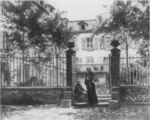Post-structuralism is a philosophical movement that questions the objectivity or stability of the various interpretive structures that are posited by structuralism and considers them to be constituted by broader systems of power. Although post-structuralists all present different critiques of structuralism, common themes among them include the rejection of the self-sufficiency of structuralism, as well as an interrogation of the binary oppositions that constitute its structures. Accordingly, post-structuralism discards the idea of interpreting media within pre-established, socially constructed structures.
The Sokal affair, also called the Sokal hoax, was a demonstrative scholarly hoax performed by Alan Sokal, a physics professor at New York University and University College London. In 1996, Sokal submitted an article to Social Text, an academic journal of cultural studies. The submission was an experiment to test the journal's intellectual rigor, specifically to investigate whether "a leading North American journal of cultural studies—whose editorial collective includes such luminaries as Fredric Jameson and Andrew Ross—[would] publish an article liberally salted with nonsense if (a) it sounded good and (b) it flattered the editors' ideological preconceptions."
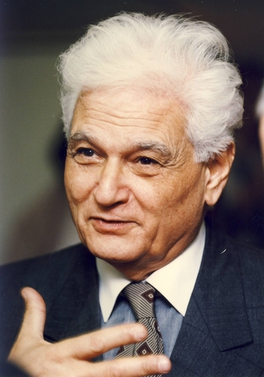
Jacques Derrida was a French philosopher. He developed the philosophy of deconstruction, which he utilized in a number of his texts, and which was developed through close readings of the linguistics of Ferdinand de Saussure and Husserlian and Heideggerian phenomenology. He is one of the major figures associated with post-structuralism and postmodern philosophy although he distanced himself from post-structuralism and disowned the word "postmodernity".

Hélène Cixous is a French writer, playwright and literary critic. During her academic career, she was primarily associated with the Centre universitaire de Vincennes, which she co-founded in 1969 and where she created the first centre of women's studies at a European university. Known for her experimental writing style and great versatility as a writer and thinker, she has written more than seventy books dealing with multiple genres: theatre, literary and feminist theory, art criticism, autobiography and poetic fiction.

Roland Gérard Barthes was a French literary theorist, essayist, philosopher, critic, and semiotician. His work engaged in the analysis of a variety of sign systems, mainly derived from Western popular culture. His ideas explored a diverse range of fields and influenced the development of many schools of theory, including structuralism, anthropology, literary theory, and post-structuralism.

Philippe Sollers was a French writer and critic. In 1960 he founded the avant garde literary journal Tel Quel, which was published by Le Seuil and ran until 1982. Sollers then created the journal L'Infini, published first by Denoel, then by Gallimard with Sollers remaining as sole editor.
"The Death of the Author" is a 1967 essay by the French literary critic and theorist Roland Barthes (1915–1980). Barthes' essay argues against traditional literary criticism's practice of relying on the intentions and biography of an author to definitively explain the "ultimate meaning" of a text. Instead, the essay emphasizes the primacy of each individual reader's interpretation of the work over any "definitive" meaning intended by the author, a process in which subtle or unnoticed characteristics may be drawn out for new insight. The essay's first English-language publication was in the American journal Aspen, no. 5–6 in 1967; the French debut was in the magazine Manteia, no. 5 (1968). The essay later appeared in an anthology of Barthes' essays, Image-Music-Text (1977), a book that also included his "From Work to Text".
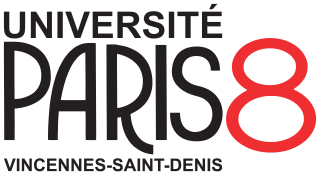
Paris 8 University Vincennes-Saint-Denis, or usually the University of Vincennes in Saint-Denis, Paris 8, is a public university in Paris, France. Once part of the historic University of Paris, it is now an autonomous public institution.
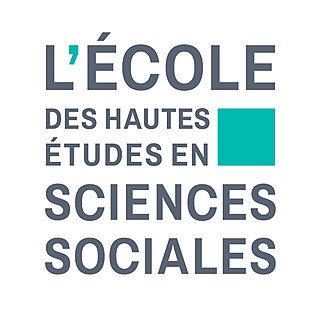
The School for Advanced Studies in the Social Sciences is a graduate grande école and grand établissement in Paris focused on academic research in the social sciences. It is regarded as one of the most prestigious institutions of graduate education in France. The school awards Master and PhD degrees alone and conjointly with the grandes écoles École normale supérieure, École polytechnique, and École pratique des hautes études.
Abdelkebir Khatibi was a prolific Moroccan literary critic, novelist, philosopher, playwright, poet, and sociologist. Affected in his late twenties by the rebellious spirit of 1960s counterculture, he challenged in his writings the social and political norms upon which the countries of the Maghreb region were constructed. His collection of essays Maghreb pluriel is one of his most notable works.
"Structure, Sign, and Play in the Discourse of the Human Sciences" was a lecture presented at Johns Hopkins University on 21 October 1966 by philosopher Jacques Derrida. The lecture was then published in 1967 as chapter ten of Writing and Difference.
The Collège international de philosophie (Ciph), located in Paris' 5th arrondissement, is a tertiary education institute placed under the trusteeship of the French government department of research and chartered under the French 1901 Law on associations. It was co-founded in 1983 by Jacques Derrida, François Châtelet, Jean-Pierre Faye and Dominique Lecourt in an attempt to re-think the teaching of philosophy in France, and to liberate it from any institutional authority. Its financing is mainly through public funds. Its chairs or "directors of program" are competitively elected for 6 years, following an international open call for proposals. Proposals are free and directors are elected after a collegial, peer-assessment of their value for philosophy. The College recognizes that philosophy is better served by being located at "intersections" such as Philosophy/Science, or Philosophy/Law. Proposals must respond to this exigency of "intersection" as wished by Jacques Derrida. The College has few registered students, who may receive the Diplôme du Collège international de philosophie, which is not a university degree but may be, in some cases, validated by French or foreign universities. Otherwise, attendance to seminars is open and free.
Barbara Ellen Johnson was an American literary critic and translator, born in Boston. She was a Professor of English and Comparative Literature and the Fredric Wertham Professor of Law and Psychiatry in Society at Harvard University. Her scholarship incorporated a variety of structuralist and poststructuralist perspectives—including deconstruction, Lacanian psychoanalysis, and feminist theory—into a critical, interdisciplinary study of literature. As a scholar, teacher, and translator, Johnson helped make the theories of French philosopher Jacques Derrida accessible to English-speaking audiences in the United States at a time when they had just begun to gain recognition in France. Accordingly, she is often associated with the "Yale School" of academic literary criticism.
20th-century French philosophy is a strand of contemporary philosophy generally associated with post-World War II French thinkers, although it is directly influenced by previous philosophical movements.
Lawrence D. Kritzman, an American scholar, is the Pat and John Rosenwald Research Professor in the Arts and Sciences, Edward Tuck Professor of French Language and Literature, and Professor of Comparative Literature at Dartmouth College. He has previously held the Willard Professorship of French, Comparative Literature, and Oratory and the Ted and Helen Geisel Third Century Professorship in the Humanities. He has written works on, edited works on, or given lectures on Barthes, Foucault, Kristeva, Sartre, Camus, Malraux, Derrida, Montaigne, de Beauvoir, and others, focusing especially on twentieth- and twenty-first century French philosophy and intellectual history. Drawing on psychoanalytic theory, he has innovated sixteenth century French studies in his readings of Marguerite de Navarre, Scève, Ronsard, Rabelais, Montaigne, and the poètes rhétoriqueurs.
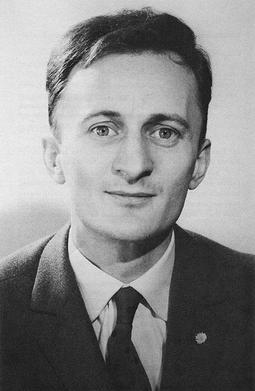
Jacques Ehrmann was a French literary theorist and a faculty member of the Yale University French Department from 1961 until his death in 1972.
François Wahl was a French editor and structuralist.

Naomi Schor was an American literary critic and theorist. A pioneer of feminist theory for her generation, she is regarded as one of the foremost scholars of French literature and critical theory of her time. Naomi's younger sister is the artist and writer Mira Schor.
The American Girls' Club in Paris was a boarding house for young American women aged eighteen to forty located at 4 Rue de Chevreuse in the 6th arrondissement of Paris, France. The club was founded in September 1893 by the American Elizabeth Mills Reid and Mrs. William Newhall. It purpose was to provide "place for meeting and for sociablllty for those who by reason of their unfamiliarity with the language and the people of the country must otherwise be lonely and be handicapped, by their ignorance.".


